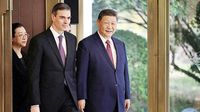China has suspended exports of rare earth metals and magnets, essential components in advanced technologies, in a significant response to escalating trade tensions with the United States. According to a report by The New York Times on April 13, 2025, the Chinese government mandated this halt on April 4, 2025, until a new regulatory framework is established. This move is perceived as retaliation against the tariffs imposed by President Donald Trump on various countries, including China, just days prior.
The suspension affects six types of heavy rare earth metals and rare earth magnets, which are critical for manufacturing products ranging from automobiles and drones to robots and missiles. The New York Times noted that the Chinese government has ordered that these exports will only be permitted under special licenses, which have yet to be implemented.
China's dominance in the rare earth market is staggering. By 2023, it accounted for 99% of the global supply of these metals, which are vital for numerous high-tech industries. The situation has raised alarms among American manufacturers, who are reportedly unprepared for such a disruption in supply. James Litinsky, the Chairman of MP Materials, the largest rare earth company in the U.S., voiced concerns about the implications this could have on future supply chains, stating, "Drones and robots are viewed as the future of warfare, and considering everything, the core elements of future supply chains are being paralyzed."
This latest development follows Trump's announcement on April 12, 2025, where he extended reciprocal tariffs to all countries, including South Korea, until July 8, 2025. While a basic 10% tariff was applied to most countries, China faced a staggering 125% reciprocal tariff. When combined with the 20% tariffs imposed after Trump's second indictment, the total tariff on Chinese goods reaches an unprecedented 145%.
China's export restrictions are not limited to the United States; they also extend to other nations, including Japan and Germany, which rely heavily on these materials for their own manufacturing processes. The New York Times reported that the Chinese customs authorities have halted exports of heavy rare earth metals and magnets to these countries as well, further illustrating the global ramifications of this trade conflict.
In 2010, during a previous dispute over the Senkaku Islands, Japanese companies experienced a similar embargo, leading them to stockpile over a year’s worth of rare earth materials. In contrast, U.S. companies have not built up significant reserves, leaving them vulnerable to supply disruptions. Analysts suggest that this lack of preparation could have dire consequences for U.S. industries that depend on these materials, including automotive, aerospace, and defense sectors.
Rare earth metals play a crucial role in various applications, such as electric motors, which are essential for modern vehicles, drones, and military equipment. They are also integral to technologies like jet engines, lasers, and even AI servers and smartphone batteries. The NYT emphasized that the new regulatory system being planned by China could permanently disrupt supplies to specific companies, including those in the U.S. military sector.
As the situation unfolds, the implications of these trade tensions could have far-reaching effects on global supply chains and technological advancements. The U.S. industrial sector's vulnerability due to a lack of stockpiles raises questions about how prepared they are to cope with such restrictions.
Moreover, the Korea Customs Service reported that in 2024, China accounted for 50.8% of South Korea's rare earth imports, indicating that neighboring countries are also at risk of being impacted by China's export policies. This situation underscores the interconnected nature of global trade and the potential for significant disruptions that can arise from geopolitical conflicts.
In conclusion, as the U.S. and China continue to navigate this complex trade relationship, the suspension of rare earth exports by China signals a critical juncture in the ongoing tariff war. The consequences of this decision will likely resonate throughout the global economy, affecting industries that rely on these essential materials.
![[속보] NYT](https://thumbor.evrimagaci.org/ZHJ0yV9NR3LLvXYyY7axIH5G5IM=/200x0/tpg%2Fsources%2Fc8a2d2d7-9fab-41b1-8de3-66dbf4f5d59b.jpeg)






